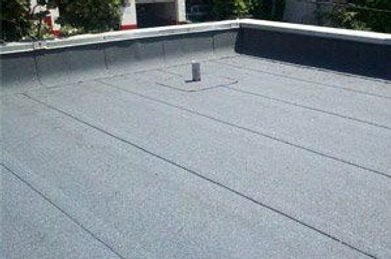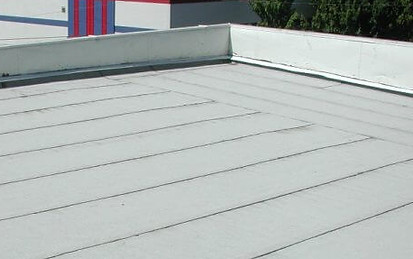
Roofing Services
For over 20 years Ironclad Roofing and Construction has been the leading roofing contractor in the Philadelphia and South Jersey area. We use only quality materials and our experienced professionals are experts in their field.
Whether you have a small leak or you need a new roof, no job is too big or too small. We are able to handle all of your residential or commercial roofing needs. Our services also include new gutters, roof decks, siding, stucco, and other home exterior needs
.
We offer free in home consultations to assure we fully understand your needs. Our experts will work with you to help select the roofing style and materials that will work best for your needs. We will then provide a full estimate, free of charge.
Roofing Styles and Materials
TPO Roofing
It is relatively commonplace to connect TPO roofing with those stark, bright, and amazingly white rooftops you’ve seen hundreds of examples of in industrial parks across the country. Yes, that’s likely TPO, a commonly used single-ply roofing material that has become popular in commercial and residential roofing design. So, in more precise terms, what is single-ply and TPO roofing, and what are their different
Single-Ply Membranes
Single-ply membranes are synthetic as well as rubber in their makeup. To adhere these membranes to a flat roof, they are either fastened mechanically, ballasted to a roof, or affixed to the insulation that forms a protective layer on a flat roof surface.
What is TPO Roofing
In scientific jargon, TPO translates to Thermoplastic Polyolefin. It is categorized as a layer of a single-ply membrane composed of synthetic components along with a fabric reinforcing scrim that stabilizes and strengthens the membrane for improved and increased performance. It consists of a smattering of different rubber types that are usually a combination of polypropylene and ethylene-propylene rubber.
TPO has gained considerable use with commercial roofing systems, particularly in covering flat roofs. It’s doubly sought after for its natural reflective ability to deflect ultraviolet waves (UV) while conserving energy and saving on utility costs.
The manufacturer fabricates the membranes themselves in sheet form, and they measure in widths of 10, 12, and 20 feet. Once cut, rolled, and assembled, the manufacturer distributes the sheets to the facility that requests and purchases the materials for commercial roofing purposes.


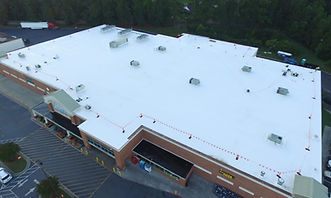

EPDM: Ethylene Propylene Diene Monomer
EPDM is an extremely durable synthetic rubber roofing membrane that is used worldwide. EPDM is available in both black and white and is sold in a variety of widths and thicknesses. Its superior durability and cost-effectiveness are part of what makes EPDM one of the most popular flat roof systems installed in the U.S. today.
There are three ways to install an EPDM rubber roof: adhered, mechanically fastened or ballasted. Each installation method has its own benefits and uses. A fully adhered system means that the roof is being glued to the surface beneath it. This is both the most time-consuming installation and the longest lasting of the EPDM systems. The most common EPDM system is mechanically attached, which has fasteners that are screwed into the deck through the insulation. Ballasted systems are loose-laid over the insulation and held in place by smooth, river-washed stoned or concrete pavers.


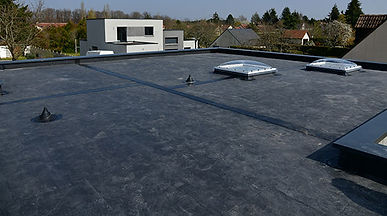
Asphalt Shingles
Going through the asphalt roof replacement process is a stressful situation. Part of that process involves choosing which asphalt shingle is to choose.
Did you know there's more than one option? There are actually 3 types of asphalt shingles.
The three types of asphalt shingles are 3-tab, dimensional, and luxury. While 3-tab used to dominate the market, dimensional shingles are the most common type installed on roofs today.
Luxury style shingles are just as heavily marketed as dimensional but are almost double the price. Continue reading to learn how the types of asphalt shingles match up on key factors such as cost, warranties, and lifespan.
3-Tab Asphalt Shingles
3-tab asphalt shingles lay flat and get their name from the 3 tabs that are on each shingle strip.
-
Cost: 3-tab shingles are the cheapest of the asphalt shingles
-
Warranty: They come out of the package with a 25-year warranty from the manufacturer
-
Lifespan: With adequate attic ventilation and proper roof installation, up to 25 years
.jpg)
Dimensional Asphalt Shingles
Dimensional shingles give you a good looking random pattern or simulate the look of a wood shake roof.
-
Cost: Around 15% more than a 3-tab shingle
-
Warranty: They come out of the package with a 30-year warranty (prorated after 10 years) from the manufacturer. You’ll also have the opportunity to register your dimensional asphalt shingle roof with the manufacturer to get the 50-year non-prorated enhanced warranty.
-
Lifespan: With adequate attic ventilation and proper roof installation, up to 30 years
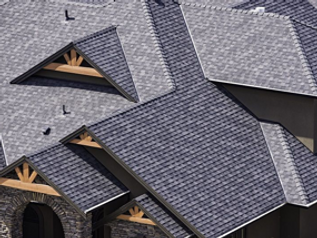
Luxury Asphalt Shingles
Luxury or premium shingles are actually larger than the other asphalt shingles and are made to look like slate.
-
Cost: Almost double the cost of a dimensional asphalt shingle.
-
Warranty: They come out of the package with a 30-year prorated warranty from the manufacturer. Just like dimensional shingles, you have the opportunity to get the 50-year non-prorated enhanced warranty.
-
Lifespan: With adequate attic ventilation and proper roof installation, up to 50 years
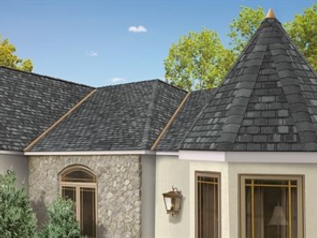
Liquid-Applied Roofing Solutions
A liquid-applied roofing system is comprised of multiple components that come together to form a fully adhered, seamless, and self-flashing membrane. GAF Liquid membranes may be used for preserving existing roofs as well as in new roof applications. Components may include liquid applied coatings and mesh membranes. A true system preserves and protects the integrity of the building.
What is a Liquid Membrane Roofing System?
A liquid-applied roofing system consists of multiple components that come together to form a fully adhered, seamless, and self-flashing membrane. Components include liquid applied coatings and mesh membranes to create a true liquid membrane system that preserves and protects the integrity of the building.
Benefits of a Liquid Membrane Roofing System
Liquid Applied Roofing Solutions can help extend the life of structurally sounds roofs through their ability to eliminate many failure points associated with many aging low slope roofs. Liquid applied roofing can also help add solar reflectivity properties to dark colored roofs greatly reducing energy costs.
What is a Roof Coating System
Roof Coatings are designed for extending the life of existing structurally sound roofs. Roof Coatings are specially formulated to extend the life of roofs while protecting them from damaging effects of weather and the environment such as UV light, water and wind. Ironclad offers roof coatings in a variety of different technologies such as acrylic, silicone and polyurethanes to meet many different building needs and budgets.
.jpg)
Types of Liquid-Applied Coatings
GAF offers multiple liquid-applied roofing system solutions, each designed for specific applications and conditions. These solutions each feature a liquid-applied component that creates a seamless, chemically resistant barrier to external elements. They can be installed over most existing roof types, eliminating the need for tear-offs or installation of recover boards. No hot kettles, no expensive installation equipment, and no special seaming devices are required.
Acrylics
Elastomeric acrylic roof coatings provide excellent durability and can be installed over existing modified bitumen, built-up, concrete, metal, or single-ply installations. These coatings are reflective and very easy to install and maintain. GAF is the leader in acrylic roof coatings, having supplied nearly a billion square feet of product throughout the last 5 decades.
Silicones
GAF offers both high solids and solvent based silicones. GAF silicones provide superior weatherproofing, ultraviolet resistance, and resistance to biological growth that helps protect against damages from ponding water. Silicone roof coatings also “chalk” less than standard acrylics increasing the time required between recoating. These products also tend to be used in high-moisture climates for their fast-drying characteristics.






Slate Roofing
True slate roof shingles are 100-percent natural stone with no additives. Much like natural granite counters, slate roofing is quarried directly from the earth.
Slate can be identified by the way the light hits it from a certain angle. This is due to slate tile's high mica content. Some slate can have up to 40-percent mica content. So, not only is it the texture of the stone that creates its unique look—it's that low-level shine, as well.
Benefits of Natural Slate
One reason for slate's superior roof-tiling quality is its cleavage abilities. Think of a good piece of slate much like a deck of cards. Because slate is a sedimentary rock, it is formed of many layers, and these layers can cleave, or slice, off like the individual cards in a deck of cards.
Slate roof shingles are aesthetically pleasing. For the right type of classic home style, slate shingles tie in well with the rest of the house.
Durability also is one of slate shingles' strong points. Slate is impervious to insects such as termites or carpenter ants. Because slate is a dense stone, it absorbs relatively little water. Excessive water is one of the causes of rot in a house. If the slate shingle roof is installed well, water will shed away.
As a stone, slate is fireproof. This alone does not protect a home from burning. But it does protect a home from burning due to sparks or embers landing on the roof.
Synthetic Slate
Synthetic slate shingles are a modern improvement on a construction classic. Made from combinations of plastic and rubber, synthetic slate is designed to mirror the beauty and uniqueness of authentic slate without the expense or installation headaches. And synthetic slate shingles last longer.
They're made by injection-molding petroleum-based materials into metal forms that are cast from authentic slate. Some brands of synthetic slate shingles are manufactured with virgin rubber or plastic, while other products incorporate recycled rubber or plastic, mineral dust or cellulose fibers. Recycled content usually consists of high-quality post-industrial materials; only a few incorporate post-consumer recycled materials.
Benefits of Synthetic Slate
Synthetic slate is considered a "green" building alternative—even those that use virgin materials—because all types of synthetic slate can be recycled at the end of a roof's usable life.
Synthetic slate shingles are more durable than authentic slate, as they contain advanced ultraviolet inhibitors to reduce wear from the sun.
Safety is built-in. Synthetic slate typically contains impact modifiers to help withstand storm damage; in fact, most are certified by Underwriters Laboratories for Class 4 impact resistance, the highest level for roofing materials. Many synthetic slates also have the highest fire-resistance rating—Class A—which means they're effective against severe exposure to external fires, are not readily flammable and do not spread fire.



Modified Bitumen
Modified Bitumen (MB) roofing is an asphalt-based, close cousin of the Built-up-Roof (BUR) designed for buildings with low-slope or "flat" roof structures. Engineered modified bitumen roofing membranes originated in Europe in the mid 1960's and have been used successfully in the United States and Canada since approximately 1975. Modified Bitumen Roofing Systems are designed to withstand harsh exposure to extreme environmental elements. With five layers of protection, it's one of the most trusted flat roofing systems used in the industry today.
Benefits of Modified Bitumen
-
Proven track record of performance
-
Superior waterproofing characteristics
-
Broad range of application method
-
Wide choice of top-surfacing, including "Cool Roofing" options
-
With insulation, provides an even better-performing building component
-
High tensile-strength
-
Available as part of a fire, wind, and/or hail rated roofing system
-
Competitive life-cycle cost
-
Available with flame-free and VOC-free installation
-
Long-term warranties are available with many MB systems


